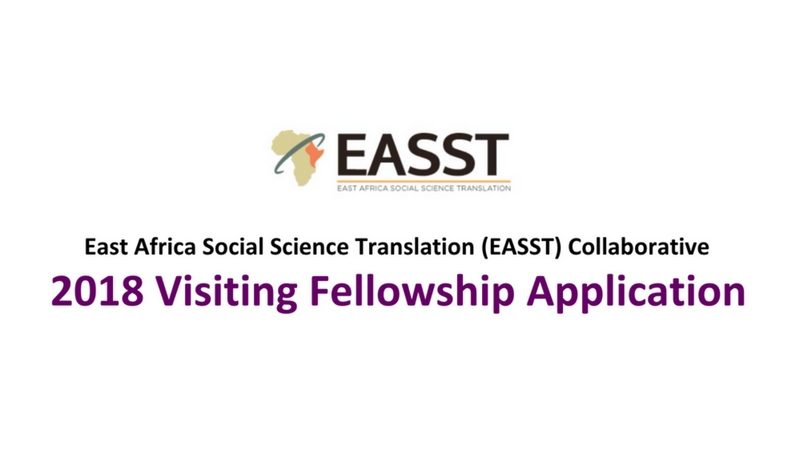Deadline: March 30, 2018
The East Africa Social Science Translation (EASST) Collaborative invites African researchers to apply for a 4-month fellowship (sabbatical) at the University of California, Berkeley. EASST is a network of East African universities and research institutions, with a mission to promote rigorous evaluation of social and economic development programs in the region
The EASST Visiting Fellowship seeks to equip East African social scientists with the skills needed to carry out rigorous evaluations of economic development programs. Researchers will be based at the University of California, Berkeley for four months during the fall academic semester (approximately August 20th – December 20th 2018) or the spring academic semester (approximately January 16 –May 11th 2019).
Each Visiting Fellow will be paired with a faculty mentor affiliated with the Center for Effective Global Action (CEGA), a research network based in the United States. A list of CEGA faculty affiliates is available here. CEGA staff and PhD students will provide additional mentorship during the fellowship and after the scholar returns home.
Benefits
The EASST program will cover the costs of room and board in Berkeley, health insurance, a monthly stipend, visa fees, and roundtrip economy airfare for selected Fellows. Please note that the fellowship does NOT provide financial support for spouses or other family members.
Upon completing the fellowship, scholars are expected to return to a university or research institute in East Africa and assume a leading role in the global effort to use rigorous evaluation and evidence for economic development.Small grants of up to $10,000 will be provided to fellows upon their successful completion of the program and arrival back in their home country for the purpose of conducting impact evaluation trainings, building institutional capacity, and forging new linkages with policymakers.
Fellows Activities
During the fellowship period, visiting researchers will:
- Participate in seminars and conferences on research in social and economic development;
- Present their own work during seminars and workshops;
- Audit courses, including rigorous doctoral-level seminars in impact evaluation;
- Carry out an independent research project under the mentorship of CEGA faculty (projects can use existing data for retrospective analysis or set-up a study design for future data collection);
- Meet and collaborate with faculty and students in multiple academic departments;
- Visit and present CEGA campuses, including UC San Diego, Stanford University, and/or UC Santa Cruz;
- Design impact evaluation curricula that will be taught at an East African institution;
- Participate in policy dissemination by contributing to policy briefs, attending meetings with policymakers and stakeholders, and presenting at events; and
- Work with the World Bank and other partners to identify opportunities for future research.
Eligibility
Eligible candidates for EASST must:
- Be a resident of an East African country (i.e. Ethiopia, Kenya, Rwanda, Tanzania, or Uganda);
- Have a PhD (completed within the last 8 years) or be enrolled in a graduate program in economics, statistics, epidemiology/public health, or another social science discipline;
- Hold a staff position at a research institution, university or other organization in East Africa, preferably one that supports policy-relevant, quantitative social science research;
- Have participated in or have familiarity with impact evaluation research(either randomized or quasi-experimental studies);
- Have participated infield-based data collection and rigorous empirical research/analysis;
- Be computer literate, fluent in English, and a strong public speaker;
- Plan to return to a research institute in East Africa for at least 1 year after the fellowship; and
-
Demonstrate a commitment to building the capacity of African research institutions/universities.
They will give preference to researchers interested in infectious diseases, agriculture, and digital financial inclusion.
Female researchers are especially encouraged to apply.
Application
Please ensure that all supporting documentation is submitted in English.
- Personal Statement(1 page): Why are you interested in being an EASST fellow, and what do you hope to accomplish during the semester and beyond?
- Curriculum Vitae/Resume
- Transcript of any coursework completed within at least the last 5 years (i.e. your scores or grades from university courses). Scanned copy is acceptable.
- Research Proposal: Not to exceed 2 pages. Refer to the Design Statement Example.
- Evidence of Leave Approval from the applicant’s supervisor or department chair demonstrating support and certifying that, if the applicant is selected, he/she will be able to take a 4-month leave of absence.
- Letters of Recommendation (2 required)
- a) One letter from a government agency or policy maker indicating the fellows past policy engagement or engagement potential. Please use the provided recommendation template.
- b) One academic letter that describes the applicant’s research capacity. Please use the provided recommendation template.
- OPTIONAL: You may attach one working paperor publication.
For more information, visit EASST Visiting Fellowship.

